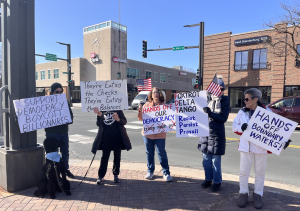To solve the migrant crisis, we first must solve the conflicts in the Middle East
October 2, 2015
Recently the news has been dominated by reports of the “European Migrant Crisis”––the huge influx of refugees displaced by conflicts in North Africa and the Middle East. With nearly a million estimated refugees entering the region over the next year, it’s unlikely that we’ll stop hearing about it anytime soon. The Crisis, which for many is embodied by a picture of a young Syrian boy who drowned and washed ashore in Turkey, has sparked massive debate on what different countries should be doing to help migrants.
People have wildly varying opinions on what they think should be done by their respective governments––if they think governments should do anything at all.
In Europe some say what’s being done is not enough; others, such as President Janos Ader of Hungary, think that all migrants should be refused entry. Similarly, in the US most of the debate centers around whether or not the US should be more or less involved.
Normally, as a Libertarian, I immediately question the US intervening in any foreign affairs, but I’m also always open to other people’s points of view. It just so happens that my grandfather, a dam engineer by trade, has a deep interest in politics and foreign affairs. A few days ago I was having one of my usual chats with my grandfather when the kitchen TV turned to a reporter from MSNBC saying how Europe and the United States need to start accepting many more refugees to accommodate the “tidal wave” of migrants.
My grandfather chuckled and said, “If any of these idiots ever took an engineering course, they wouldn’t be making such stupid remarks on television. The first thing we learned when we were getting taught about dam building is what to do if there’s a hole in the dam, and any engineer worth his salt knows that when there’s a leak, you don’t go and try and put a bucket under it, you go and you plug the hole. Because everyone knows that there’s no bucket big enough to hold a river, much less a ‘tidal wave.’ So while all of these politicians are trying accommodate these people coming to their countries, they put no thought on why they might be coming there. Instead of trying to give them new homes in Europe, why not just end the conflicts so they can go back to their real homes?”
At the time I just nodded in agreement, and we went on to talk about less dreary topics, but now I’m starting to realize that my grandfather was right.
We need to work on ending the crisis in the Middle East––in order to end the crisis in Europe.
Now obviously, this isn’t going to be easy. Stabilizing the Middle East is something that the US has attempted, and subsequently failed to do, multiple times, so this time we’re probably going to have to try something a little bit different than a full out invasion.
Since force of arms hasn’t exactly had the best track record in the past (due to the incredibly complicated religious, tribal, and sectarian divides in the Middle East), we need to take a more peaceful approach. The US needs to start putting even more pressure on Syria, hopefully facilitating negotiations to bring peace to a country ravaged by civil war. If we can reconcile the Syrian government with the rebels and hopefully bring about some legislative change, we can stabilize that country, and hopefully bring their weapons to bear against the other main power player: ISIS.
ISIS is a bit of an odd-man-out. Since negotiations are pretty much impossible and many of the countries fighting ISIS are also fighting each other or us on some level, the US can’t really do anything without angering half of the region. But, most of the Middle East is united against ISIS as a common enemy, and letting them defeat it together may be a way to bring some level of regional unity.
But at the end of the day, all of this has been tried and has failed before, making anything the US does unlikely to work and guaranteed to bring a massive amount of ridicule both at home and abroad. So, if we want to get something done and not enrage millions of people, we may need to get creative, and with over 30 years of failed foreign policy in the Middle East, I think it’s about time we got started.




































![Teacher Lore: Mr. Hillman [Podcast]](https://bsmknighterrant.org/wp-content/uploads/2025/03/teacherlorelogo-1200x685.png)













Ethan Cossio • Oct 26, 2015 at 3:57 pm
I just wonder if both accommodating Muslim refugees and trying an end to the civil war can happen simultaneously. It’s just like you said, it’s not going to be easy to just end the war and who knows when that will happen. Ending the war sounds like a great solution, but until that actually happens, what would people do about the people that are swarming Europe seeking a better life and refuge? I suppose what I’m trying to say is that while efforts to ending the war as soon as possible should be made, I think its crucial to mitigate the growing problem of the Migrant Crisis by helping the Muslim refugees. Those are just my two cents. I’m actually writing an essay for a college English class about this right now.
Claire Shea • Oct 20, 2015 at 11:56 am
You wrote a fantastic article, Lucas. I don’t necessarily agree with you, but your grandfather posed a very interested analogy to consider amidst this crisis.